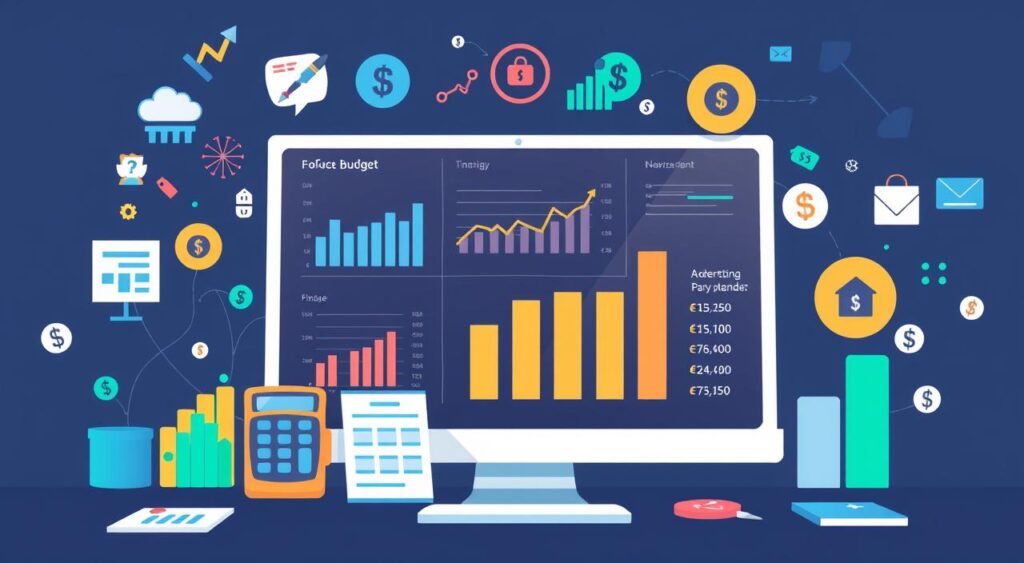In today’s digital world, businesses in India are looking for ways to grab attention and get results. PPC or Pay-Per-Click advertising is a key tool for marketers. But what is PPC, and how can it help your business?
PPC, or pay-per-click advertising, lets businesses show ads on search engine results pages and other online spots. They only pay when someone clicks on their ad. This way, you can target your audience well, see how your campaigns do, and make your marketing better.

Key Takeaways
- PPC, or pay-per-click advertising, is a digital marketing strategy where businesses only pay when a user clicks on their ad.
- PPC allows you to precisely target your audience, measure the effectiveness of your campaigns, and optimize your marketing efforts.
- PPC plays a critical role in your overall digital marketing strategy, complementing other channels like SEO, social media, and email marketing.
- Effective PPC campaigns can drive high-quality leads, increase brand awareness, and deliver a strong return on investment (ROI).
- Understanding the key components of PPC, such as the bidding process, ad rank, and quality score, is crucial for running successful campaigns.
Understanding Pay-Per-Click Advertising Basics
Pay-per-click (PPC) advertising is a digital marketing strategy. Businesses pay for each ad click. It lets you target specific audiences and track your campaigns’ performance.
By knowing PPC’s key components, you can use it well in your digital marketing. This can bring big benefits to your business.
Key Components of PPC Campaigns
Successful PPC campaigns need targeted keywords, compelling ad copy, and optimized landing pages. You must pick the right keywords, write catchy ad text, and make sure landing pages are user-friendly.
How PPC Fits into Digital Marketing
PPC is great with other digital marketing like SEO and social media. It quickly brings targeted traffic and leads. SEO improves your site’s organic visibility over time.
PPC data helps improve your digital marketing efforts. It’s a powerful tool for your marketing strategy.
Benefits of PPC for Businesses
- Targeted reach: PPC lets you target specific demographics and interests, ensuring your message reaches the right audience.
- Measurable results: You can track and analyze PPC campaign performance. This gives you valuable data to improve your ROI.
- Flexibility and control: You can adjust PPC campaigns in real-time. This lets you respond to market changes or test new strategies.
- Immediate impact: PPC can bring immediate traffic and leads. It’s great for businesses needing quick results.
Understanding PPC and how it fits with your digital marketing strategy is key. It helps you reach your audience, drive conversions, and meet your business goals.
What is PPC or Pay-Per-Click Advertising?
Pay-per-click (PPC) advertising is a way for businesses to advertise online. They pay each time someone clicks on their ad. This is different from other ads, where you pay for every view, not just clicks.
In what is pay per click marketing, businesses set a budget and bid on keywords. Their ads show up for users searching those terms. The cost per click, or cost-per-click (CPC), is set through an auction. This means businesses only pay when their ad is clicked by the right person.
What is pay per click in digital marketing is great because it gives instant data on how ads perform. Advertisers can see how many people click, convert, and how much they spend. This helps them improve their ads and get better value for their money.
“PPC advertising is a game-changer for businesses looking to reach their target audience and drive measurable results. It offers unparalleled precision, flexibility, and data-driven insights to help you maximize your marketing ROI.”
Overall, what is ppc in advertising is a powerful tool for businesses. It helps them promote their products, target specific groups, and get more leads and sales. By understanding PPC, businesses can grow and succeed online.
How PPC Advertising Works in Practice
To get a grasp on pay-per-click (PPC) advertising, let’s explore its key parts. This includes the bidding process and how campaigns are set up. Knowing how PPC works can help your business use it to its fullest.
Bidding Process Explained
The heart of what is google ppc pay per click advertising is the bidding. Advertisers compete by bidding on keywords. Your bid, or how much you’re willing to pay for a click, affects your ad’s spot in search results.
But, it’s not just about the highest bid. Other factors also play a role in your ad’s success.
Ad Rank and Quality Score
In what is pay per click (ppc), Ad Rank is key. It’s a mix of your bid and Quality Score. Your Quality Score shows how relevant and good your ad and landing page are.
Ads with a high-Quality Score can rank better, even with lower bids. This means you can get more value from your PPC efforts.
Read More: How to Set the Perfect Google Ad Budget for Success
Campaign Structure and Organization
Good pay-per-click (ppc) advertising campaigns need a solid plan. This means grouping keywords, writing great ad copy, and making landing pages user-friendly. A well-organized campaign can boost your PPC results.
Understanding PPC lets you better navigate bidding and use Ad Rank and Quality Score. It also helps you set up campaigns for the best results. Learning the practical side of what is google ppc pay per click advertising is crucial for success.
Major PPC Platforms and Their Unique Features
Businesses have many PPC platforms to choose from. Each has its own special features and benefits. Let’s look at some major PPC platforms and how they can help your ads.
Google Ads: The Versatile Giant
Google Ads, once known as Google AdWords, leads in PPC advertising. It offers a wide reach and advanced targeting. You can create targeted ads for search, display, and video.
From what is amazon ppc pay per click advertising to search ads, Google Ads is very flexible. It helps you reach your audience in many ways.
Microsoft Advertising: The Underrated Powerhouse
Microsoft Advertising, once Bing Ads, is a strong PPC platform. It’s often overlooked but is very effective. It has a big user base and a unique search engine share.
Microsoft Advertising is great for explaining ppc or pay per click advertising. It reaches a different audience than Google Ads. Its targeting and pricing are competitive, making it a good choice for PPC campaigns.
Amazon Advertising: The E-commerce Specialist
For Amazon sellers, what is amazon ppc pay per click advertising is key. Amazon Advertising offers many ad formats. These include Sponsored Products, Sponsored Brands, and Sponsored Display.
These ads help show products and drive sales on Amazon. With its unique data and Amazon integration, Amazon Advertising boosts visibility and sales for e-commerce businesses.
| PPC Platform | Key Features | Audience Reach | Pricing Model |
|---|---|---|---|
| Google Ads | Extensive targeting options Comprehensive campaign management Integration with YouTube and other Google properties | Vast, covering search, display, and video | Cost-per-click (CPC) bidding |
| Microsoft Advertising | Access to unique Bing search audience Advanced targeting capabilities Competitive pricing options | Significant search market share | Cost-per-click (CPC) bidding |
| Amazon Advertising | Seamless integration with Amazon’s e-commerce platform Targeting based on Amazon customer data Variety of ad formats for product promotion | Highly engaged Amazon shoppers | Cost-per-click (CPC) bidding |
Understanding each PPC platform’s unique features helps businesses choose the right one. Whether it’s what is amazon ppc pay per click advertising, explaining ppc or pay per click advertising, or using Google Adwords, these platforms offer many options. They help businesses succeed in digital advertising.
Creating Effective PPC Campaigns
Pay-per-click (PPC) advertising success comes from making compelling campaigns. These campaigns grab your audience’s attention. This guide will show you how to make great PPC campaigns. We’ll cover keyword research and landing page optimization.
Keyword Research and Selection
Keyword research is key for a PPC campaign. Find out what your potential customers search for. Use tools to find keywords that bring in the right traffic.
- Do a deep market analysis to know what your audience searches for.
- Use tools to find keywords that work well and are less competitive.
- Choose long-tail keywords for their specificity and lower competition.
- Keep updating your keywords based on how well they perform.
Ad Copy Best Practices
Good ad copy grabs your audience’s attention and gets them to act. Follow these tips to make ad copy that speaks to your customers:
- Make it clear what makes your product or service special.
- Use headlines that grab attention and solve problems.
- Put your keywords in the ad copy naturally.
- Include a strong call-to-action (CTA) to get people to click.
- Try different ad versions to get better click-through rates (CTR).
Landing Page Optimization
The landing page is the last step in your PPC advertising journey. It’s crucial for turning clicks into leads or sales. Make your landing pages great to improve user experience and boost conversions:
| Best Practices | Key Benefits |
|---|---|
| Ensure a clear, compelling value proposition | Clearly communicates the unique benefits of your offer |
| Use visually appealing and mobile-responsive design | Enhances user experience and reduces bounce rates |
| Include relevant, high-quality content and visuals | Educates and engages visitors, driving them to convert |
| Optimize for fast loading speeds | Improves user experience and search engine rankings |
| Implement clear call-to-action (CTA) buttons | Encourages visitors to take the desired action |
Mastering these key elements of PPC campaigns will help you get more traffic, increase conversions, and get a better return on your ad spend.
PPC Budgeting and Cost Management
Managing your budget and costs is key in pay-per-click (PPC) advertising. PPC is a powerful digital marketing tool. But, it needs careful planning and optimization to get the best value from your ad spend.
Figuring out the right budget for your campaigns is important. It depends on your industry, target audience, and competition. Start with a small budget and increase it as you learn more about your campaign’s performance.
- Spread your budget across different campaigns and ad groups based on their performance and potential return.
- Keep an eye on your cost-per-click (CPC) and adjust your bids to stay within your budget and boost your ROI.
- Use PPC reporting and analytics tools to track your spending and find ways to improve.
Also, think about the long-term effects of your PPC campaigns. While getting immediate sales or leads is important, consider the value of customer lifetime, brand awareness, and other indirect benefits too.
“Effective PPC budgeting and cost management can be the difference between a successful campaign and a costly disappointment. By taking a strategic approach, you can maximize the impact of your advertising dollars and drive meaningful results for your business.”
By following best practices for PPC budgeting and cost management, you can make sure your PPC efforts match your marketing strategy. This way, you can get a positive ROI for your business.

Measuring PPC Success: Key Metrics and KPIs
When you’re looking at the success of your what is ppc pay per click advertising campaigns, data is crucial. The right metrics help you see how your what is ppc pay per click marketing is doing. This lets you make smart choices to improve your strategy.
Important Performance Indicators
Here are some key metrics to watch for your PPC campaigns:
- Click-through rate (CTR): The percentage of users who click on your ad after seeing it.
- Conversion rate: The percentage of users who take the desired action, such as making a purchase or filling out a form.
- Cost per acquisition (CPA): The average cost to acquire a new customer or lead.
- Return on ad spend (ROAS): The revenue generated for every dollar spent on advertising.
Tracking and Analytics Tools
To track and analyze your PPC performance, you’ll need strong analytics tools. Google Analytics is a top choice, offering detailed data on user behavior and campaign performance. You can also use the ad platform’s own reporting tools, like Google Ads or Microsoft Ads.
ROI Calculation Methods
Understanding the return on investment (ROI) for your PPC campaigns is key. It shows how well your spending is working. To figure this out, you’ll need to look at the revenue from your ads, the cost of the campaigns, and other important factors. By using different ROI calculation methods, you can see how profitable your what is ppc pay per click advertising efforts are.
“Measuring the success of your PPC campaigns is essential for making data-driven decisions and optimizing your marketing strategy.”
Common PPC Mistakes to Avoid
Pay-per-click (PPC) advertising is a great way for businesses to get more traffic and leads. But, it’s important to avoid common mistakes to make the most of it. By avoiding these errors, you can get a better return on your investment and meet your marketing goals.
One big mistake is picking the wrong keywords. Using the wrong keywords means your ads might not reach the right people. This can lead to fewer clicks and wasted money. To fix this, do thorough keyword research and keep updating your list to target the right phrases.
Another mistake is ignoring negative keywords. Negative keywords help keep your ads from showing up for the wrong searches. If you don’t use them, your ads might reach people who aren’t interested, costing you more money and getting you fewer conversions.
- Don’t forget about mobile optimization. More and more people use their phones to search online. Make sure your PPC ads work well on mobile devices. This means creating ads and landing pages that are easy to use on phones and adjusting your bids for mobile users.
- Regularly check and tweak your campaigns. PPC is all about trying and improving. If you don’t keep an eye on how your campaigns are doing and make changes, you might miss out on good opportunities.
By avoiding these common PPC mistakes, businesses in India can make their PPC ads more effective. This means more people visiting their websites, which can help their business grow.

“Effective PPC campaigns require constant optimization and a data-driven approach. By learning from your mistakes, you can continuously refine your strategy and achieve better results.”
Conclusion
What is ppc or pay-per-click advertising? and what is pay per click and how does it work are key for businesses in India. PPC advertising is a strong tool for driving traffic, getting leads, and increasing sales.
In this guide, you’ve learned the basics of PPC. You know about the important parts of a campaign, the bidding process, and the best platforms. You’ve also found out how to write great ad copy, improve landing pages, and manage your budget.
Now, you’re ready to boost your digital marketing with PPC. Start using PPC to grow your business. With the right strategy and ongoing improvement, PPC can greatly help your marketing efforts.
FAQ
What is PPC or Pay-Per-Click Advertising?
PPC (Pay-Per-Click) advertising means you pay for each ad click. It helps businesses get more website visitors. You only pay when someone clicks on your ad.
How Does PPC Advertising Work?
PPC works by bidding on keywords. When someone searches for those keywords, your ad might show up. If clicked, you pay the bid amount. The goal is to get more visitors and turn them into customers.
What are the Benefits of PPC Advertising?
PPC has many benefits. It’s targeted, measurable, and easy to adjust. You can reach people when they’re looking for what you offer. You can also see how your ads are doing and make them better.
What are the Major PPC Platforms?
The top PPC platforms are Google Ads, Microsoft Advertising, and Amazon Advertising. Each has its own features and ways to target people. You can pick the best one for your goals and audience.
How Do I Create Effective PPC Campaigns?
To make great PPC campaigns, start with good keyword research. Write compelling ad copy and make your landing pages convert well. Always check how your campaigns are doing and make changes to get better results.
How Do I Measure the Success of My PPC Campaigns?
To see how well your PPC campaigns are doing, track CTR, conversion rate, CPA, and ROI. These metrics help you see what’s working. You can then make smart changes to improve your campaigns.
What are Some Common PPC Mistakes to Avoid?
Avoid mistakes like bad keyword choices, ignoring negative keywords, and not optimizing for mobile. Don’t forget to test different ads and target groups. Also, make sure to use your budget wisely. Always keep learning and improving your PPC strategy.
𝐒𝐰𝐚𝐠𝐚𝐭 𝐆𝐚𝐰𝐚𝐝𝐞
Digital Marketer | Content Creator | Growth Strategist
With 2 years of hands-on experience in the dynamic world of digital marketing, Swagat Gawade specializes in crafting compelling strategies that drive growth and engagement. From managing ad campaigns to optimizing SEO, Swagat has a proven track record of boosting brand visibility and achieving measurable results.
Key skills:
𝐒𝐨𝐜𝐢𝐚𝐥 𝐌𝐞𝐝𝐢𝐚 𝐌𝐚𝐫𝐤𝐞𝐭𝐢𝐧𝐠: Building impactful campaigns that resonate with audiences.
𝐂𝐨𝐧𝐭𝐞𝐧𝐭 𝐌𝐚𝐫𝐤𝐞𝐭𝐢𝐧𝐠: Creating engaging, high-quality content tailored to target markets.
𝐒𝐄𝐎 & 𝐒𝐄𝐌 𝐄𝐱𝐩𝐞𝐫𝐭𝐢𝐬𝐞: Ensuring brands rank high and stay competitive in search results.
𝐀𝐧𝐚𝐥𝐲𝐭𝐢𝐜𝐬 𝐏𝐫𝐨𝐟𝐢𝐜𝐢𝐞𝐧𝐜𝐲: Leveraging data to refine strategies and enhance ROI.
Swagat’s passion for learning fuels a constant pursuit of innovative marketing solutions, making him a valuable asset in today’s fast-evolving digital landscape.


